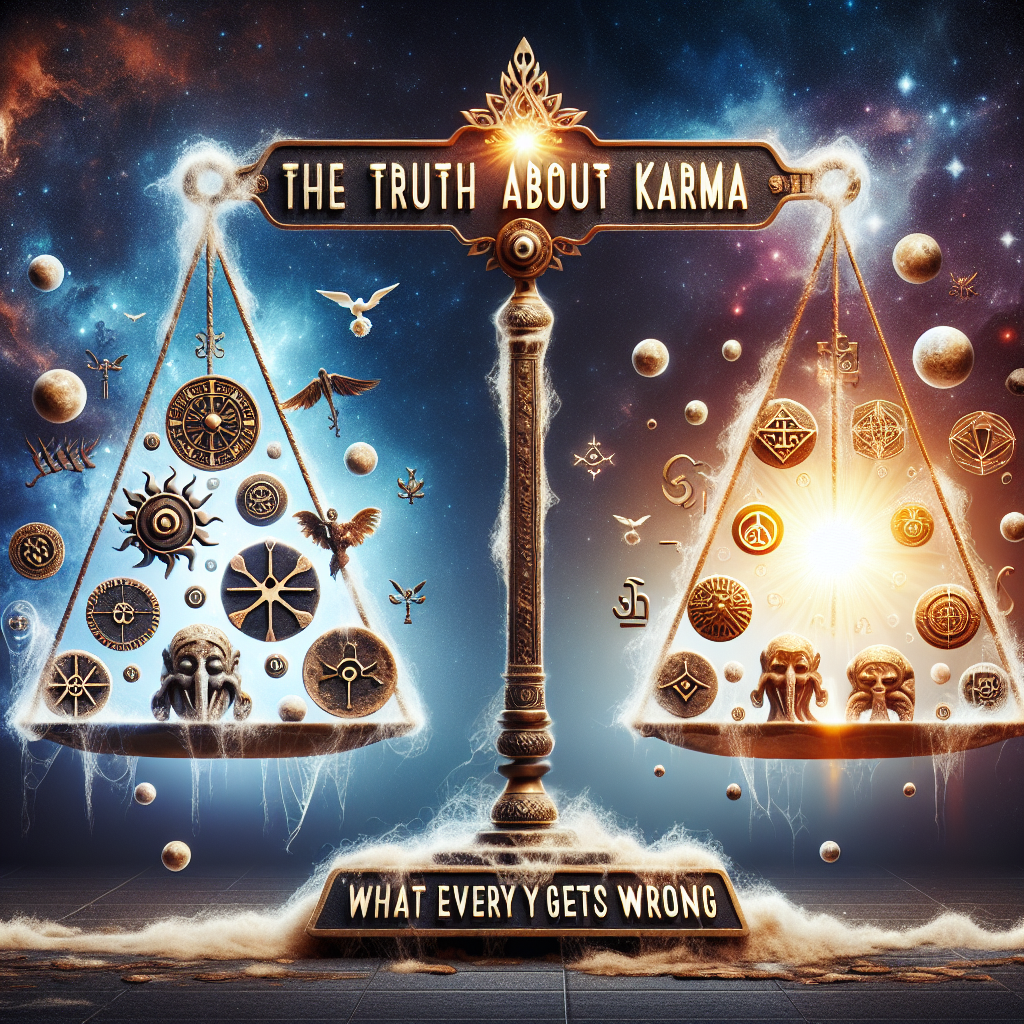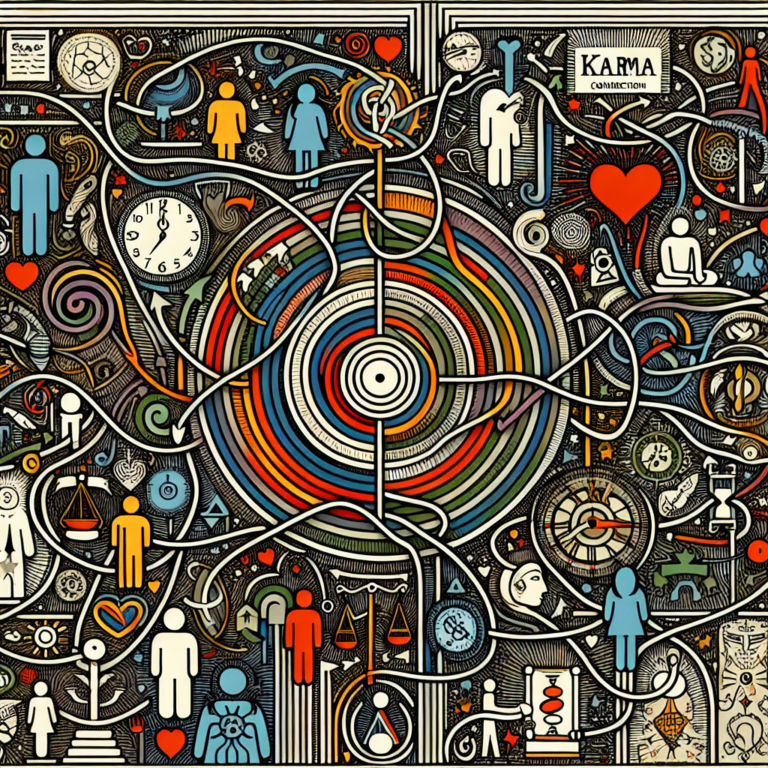The Truth About Karma: What Every Myth Gets Wrong
Karma is a concept that has captured the imagination of people around the world. Often reduced to simplistic ideas of “what goes around comes around,” karma is frequently misunderstood and misrepresented. This article aims to unpack the intricacies of karma, dispelling common myths and shedding light on what this ancient principle truly entails.
Understanding Karma’s Roots
The term "karma" originates from the Sanskrit word meaning "action." In its most basic sense, karma refers to the idea that all actions have consequences. This principle is a fundamental tenet in various Eastern philosophies, particularly Hinduism and Buddhism, where it encapsulates a moral framework guiding ethical behavior.
However, karma is more than just a system of rewards and punishments. It is a complex doctrine that involves intention (or "sankhara") and the law of cause and effect. The essence of karma emphasizes that it is not solely the action itself but the intention behind the action that shapes one’s karmic destiny. This nuance is often overlooked in popular interpretations of karma.
Myth #1: Karma is a Punishment System
One of the most pervasive myths surrounding karma is the notion that it operates as a system of punishment or retribution. According to this view, when someone commits a wrongful act, they are bound to receive a corresponding negative consequence. While it is true that harmful actions often result in negative experiences, the karmic framework is more intricate.
In reality, karma is not about punishment; it is a natural law of cause and effect. If an individual engages in negative actions, the consequences may manifest as hardships or suffering, but this is not a divine retribution. Rather, it is an inevitable outcome of the energy and intention behind those actions. Understanding karma as a natural law allows for a more compassionate perspective, both towards ourselves and others.
Myth #2: Karma is Instant
Another common misconception is that karma operates on an instantaneous timeline. The idea that someone who engages in wrongdoing will immediately face consequences can lead to frustration and confusion. The truth is, karma’s effects often unveil in varying timeframes, sometimes taking years or even lifetimes to manifest.
In many Eastern philosophies, this understanding is tied to the concept of reincarnation. An individual’s actions in one life can influence their conditions and experiences in subsequent lives. This aspect of karma emphasizes patience and self-awareness rather than immediate gratification or punishment.
Myth #3: Good Karma Guarantees Good Fortune
Many people believe that simply performing good deeds will guarantee an abundance of good karma and, hence, good fortune. While positive actions do generate beneficial results, the connection between good deeds and positive outcomes is not as straightforward as it seems.
Karma is affected by the intention behind the action, as well as the context in which it occurs. It is possible for individuals with good intentions to experience difficult circumstances, just as those with malintent may appear to prosper. Life is complex, and factors such as social context, personal history, and even random chance play significant roles in shaping our experiences.
Myth #4: Karma is a One-Way Street
Another erroneous belief is that karma operates as a linear path, resulting in a life where one constantly receives what they deserve—good or bad. However, karma is more accurately described as an interconnected web of cause and effect, involving multiple lives and experiences.
This web illustrates how our actions not only affect our lives but also ripple into the lives of others. An individual’s karmic journey is shaped not only by their actions but also by the interconnected nature of existence. A single action can affect a multitude of people and events, creating a web of experiences where karma is dynamic and multidimensional.
Myth #5: Only Humans Generate Karma
Many believe that only humans are subject to karma. While it is true that human actions are often the focus of discussions around karma, the interconnectedness of all living beings means that every entity contributes to the karmic tapestry. Animals, plants, and even inanimate objects play a part in the cycle of cause and effect.
In Buddhist philosophy, for example, all sentient beings are considered part of the karmic circle. The actions of one can indeed impact the lives of many, emphasizing the importance of compassion and mindfulness in our interactions with the world around us.
Embracing a Holistic Understanding of Karma
To genuinely grasp karma, it is essential to approach it with an open heart and a willingness to engage with its complexity. Understanding that our intentions matter, that consequences may take time to unfold, and that all beings are interconnected can help foster a more harmonious approach to life.
Engaging with karma means adopting a mindset of awareness and compassion. By doing so, we can make conscious choices that contribute positively to our own lives and the lives of others. Instead of relying on the notion of karma as a punishment or reward system, we can view it as an opportunity for growth, learning, and connection.
FAQs About Karma
Q1: What is the basic definition of karma?
A1: Karma is a Sanskrit term meaning "action." It refers to the principle of cause and effect, where every action has consequences based on the intention behind it.
Q2: Is karma only about negative consequences?
A2: No, karma encompasses both positive and negative consequences. Good intentions can lead to positive outcomes, while negative intentions can result in challenges or suffering.
Q3: Why does it seem like bad people sometimes prosper?
A3: Karma operates on a complex web of cause and effect that can unfold over time. Immediate rewards or punishments may not always reflect the ultimate consequences of one’s actions.
Q4: Do animals experience karma?
A4: Yes, all living beings contribute to the karmic web. Their actions, just like human actions, have consequences that affect the interconnected web of life.
Q5: How can I cultivate good karma?
A5: Cultivating good karma involves engaging in positive actions with good intentions, practicing compassion, and being mindful of how your actions affect others. Additionally, self-reflection and learning from past experiences can guide you in making more conscious choices.
In conclusion, understanding karma in its true form can profoundly impact how we perceive our actions and their consequences. It serves as a reminder of our interconnectedness and the importance of living with intention and compassion.
It seems like you wanted to provide a prompt but didn’t include one. Please share the details or subject you would like to discuss or explore, and I’ll be glad to help!, #Truth #Karma #Myth #Wrong, #Truth #Karma #Myth #Wrong, 1736256376, the-truth-about-karma-what-every-myth-gets-wrong





